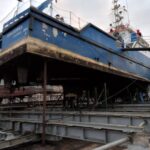Sri Lanka boasts a wealth of maritime experts, a resource that becomes particularly evident during many disasters. The Xpress pearl disaster showcased the array of experts and legal professionals who discussed the impacts on marine life, chemical damages, and the fishing industry. However, as time passes, these critical issues often fade from public memory and attention.
This pattern of neglect highlights a significant problem: a lack of sustained mechanisms to address and manage maritime disasters effectively. Despite having discussed and proposed such mechanisms, there is an apparent disinterest in their implementation. This apathy persists even as well-paid maritime professionals, often earning international salaries, show concern over these issues. The question remains: what tangible actions are they taking for their homeland, Sri Lanka?
The situation was evident in 2009 when Sri Lanka attempted to claim the continental shelf. The survey work, despite hiring a specialized survey vessel , was unsuccessful, reflecting a broader issue of ineffective maritime management. This failure has not stirred the public, who remain largely unaware of the stakes involved. But same expertise involved in such malpractices are still holding high caliber designations in various government institutions related to ocean affairs .
Moreover, the narrative around Sri Lanka’s Ocean resources is often romanticized as the “pearl of the Indian Ocean.” Yet, this superficial admiration does not translate into meaningful action to protect or utilize these resources properly. An illustrative example is the attempt to remove the Traffic Separation Scheme (TSS) from Dondra head , driven by experts more interested in their image-building than genuine conservation.
As the pioneer of whale watching in Sri Lanka, I witnessed firsthand its transformation from a fun project under the Ceylon Fishery Harbors Corporation (CFHC) into a lucrative business. However, current regulations are inadequate, likened to killing the hen that lays golden eggs instead of sustainably harvesting its feathers. Effective regulation could involve limiting the number of boats per day, ensuring both tourist satisfaction and whale conservation. Pushing the TSS down from Dondra is not a viable solution, as it would only reduce the nautical miles without addressing the root issues.
In 2009, scholars involved in continental shelf claims and the Oluvil port project presented a false report in 2012, alleging whale deaths due to ship collisions in the TSS. This report, devoid of factual backing, underscores a troubling trend of misinformation. It is crucial to address such inaccuracies, as they mislead public perception and policy.
Furthermore, writing about a TSS in Sri Lanka in the context of a whale hit by a ship from the Arabian Sea is misleading. This sensitive issue demands accurate media reporting and public engagement to explore our vast maritime potential genuinely. False narratives about the Cobalt Mountain or calls to remove the TSS are detrimental to our national interests.
As someone involved in marine tourism and on the steering committee for creating a tourism roadmap, I recognize the challenges. The current composition of the committee, dominated by individuals with personal agendas, is unfair. Effective roadmap creation requires a dedicated, skilled team, not just any foreign company lacking analytical expertise. A competent team could achieve significant progress in a few months, free from political and bureaucratic hindrances.
Sri Lanka’s maritime sector requires a proactive, sustained approach to management and conservation. We must move beyond superficial accolades and address the core issues with accurate information, effective regulations, and committed expertise. Only then can we harness the true potential of our maritime resources for the nation’s future.
Ayesh Indranath Ranawaka
Executive Director INORA
ocean 1 st by oceanlust







Leave a Reply